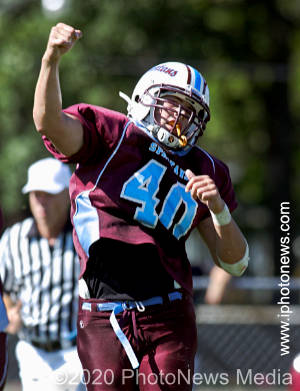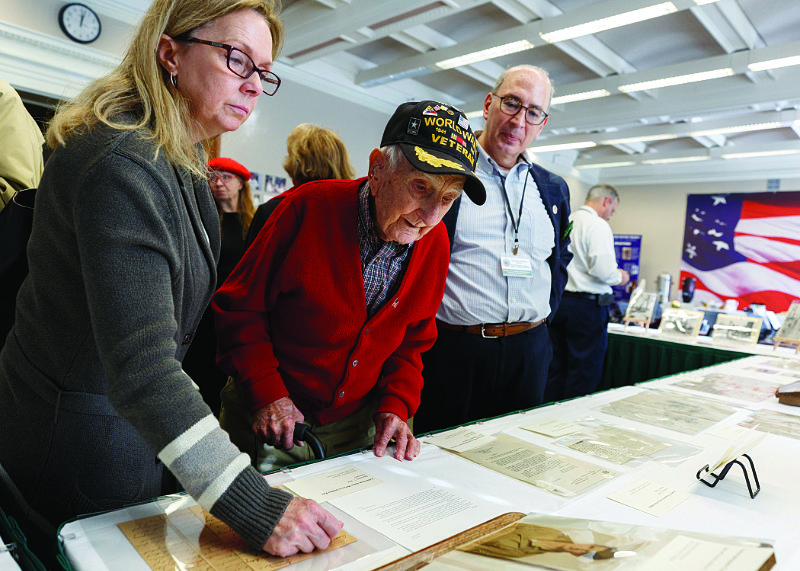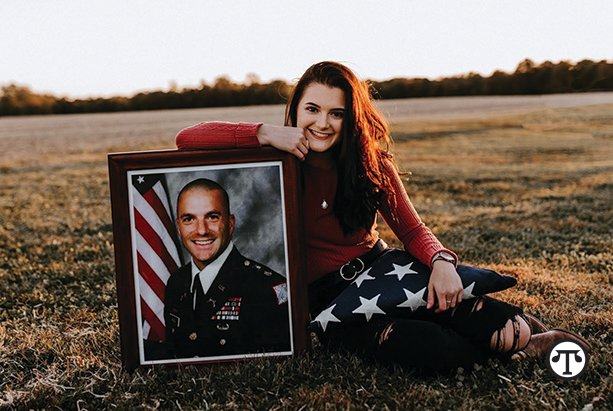Earlier this week, Army Captain Drew Arteaga returned home from a eight and half month deployment to Afghanistan. Seven of those months were spent in-country furthering America's mission on preventing terrorism.

Drew Arteaga celebrates a Spartan touchdown in the team's home game against Carterville in September of 2010. SJO rolled to a 36-20 victory after scoring three unanswered second half touchdowns. (Photo: PhotoNews Media/Clark Brooks)
|
Arteaga, who graduated from St. Joseph-Ogden High School in 2011, enlisted in the national guard in January of 2012 after joining ROTC while a student at Eastern Illinois University. At the end of that semester, he underwent basic military training that May. When he graduated from college with his bachelor's degree he was also commissioned a second lieutenant in the Army.
Later, he was hired to teach Physical Education at Westville High School and became the an assistant coach under long time coach Jeff Millis in 2015. Two years later, he was handed the reigns of the varsity program. He also coaches track and field.
He left on July 27 last year and made it home April 19th after spending two weeks in quarantine. The next day a parade of cars with friends, his players, fire engines and law enforcement vehicles drove by his house in St. Joseph to formally welcome him home and for his service.
"It was incredible to hear all the sirens," Arteaga told WCIA. It was a incredible gesture from the community for the former Spartan football and basketball player. "I'm really thankful for all the people who came by. It really awesome."
Now that he is back, he has a couple of new missions, one that includes his wife of almost two years, Lyndsey, and the other is rebuilding the Westville basketball program.
Here's where we get real with Drew Arteaga.
The Sentinel: What motivated you to serve your country when you signed the Army paperwork?
Arteaga: I always thought being a member of the military would be a neat thing to do. I can still remember where I was during 9/11 and when I had the opportunity to join, I took advantage of it. I will be honest and say one of the reasons I looked at joining was because I needed some financial help to get through college and the military provided me that. Additionally, I think being part of the ROTC program provided me a little more structure and discipline to keep me on the right path during college. Joining was probably one of the top three best decisions of my life.
The Sentinel: What was your first day like in-country?
Arteaga: We knew ahead of time that we were going to one of the most dangerous bases in Afghanistan. It didn't take us long to figure out why when we heard the sirens for an incoming rocket within the first hour of being on ground. After that, it was a day of drinking from a fire hose with all of the information I had to learn from the guy I took over for.
The Sentinel: If you can discuss it, what was the most stressful moment you had to deal with and how did you overcome the situation?
Arteaga: The biggest challenge and most stressful time during the deployment was assisting with the right sizing of our base due to the peace talks with the Taliban. I served as the project manager for over $9.5 million worth of projects in addition to our day to day operations. It was certainly a challenge and my team and I worked long hours to achieve our mission, but I think we did a great job.

Arteaga takes the ball to the paint in SJO's home game against Olympia in 2010. (Photo: PhotoNews Media/Clark Brooks)
|
The Sentinel: You probably didn't have much down time, but when you did, what did you do to unwind and decompress?
Arteaga: Working out was the best way to unwind and decompress for me. If I wasn't working out then I usually spent time talking to my wife, thinking about basketball, or watching a movie in my room.
The Sentinel: Describe your battle buddy? What made the two of you an invincible team in your unit?
Arteaga: I had two guys that I became very close with during my deployment. One was my boss and the other was the Sergeant Major of our base. We worked out together, ate together, and worked together just about everyday. We built a relationship that we could work together on solving problems and also have fun at the same time. Both of them are outstanding leaders and people. They are incredibly smart, gave clear guidance, and provided experience that they were able to use with all problem sets that we came across. I learned a ton from them and will maintain contact with them for years to come.
The Sentinel: What were the first three things you told yourself you would do when you got back on the trip home? How far are you down the list at this?
Arteaga: This is a good question.
1. As weird as it sounds I really wanted 3 foods- McDonald's, Rochs, and El Toro. I still have yet to go to McDonald's, but the other two were just as good as I remembered.
2. I really want to get back in the gym and weight room with my athletes. Missing this last season was challenging for me and all I want to do is get back with our guys and start getting better for next season. COVID hasn't let that happen yet.
3. I want to start a family. My wife was a trooper the last 8.5 months and after the deployment we feel we are in a good spot to start one. We are still working on that.
A two-sport athlete in high school, how did that prepare you for the stress of active duty and managing subordinates?

Arteaga (right) talks to a player during the timeout as an assistant coach for the Westville at the 2016 Leader Classic Holiday Tournament. Now the head coach, he is looking forward to begin working on rebuilding the program into a winning culture. (Photo: PhotoNews Media/Clark Brooks)
|
Arteaga: I think athletics, in general, are a great way for everyone to learn valuable life lessons. There is a long list of ways I think being part of sports in high school helped me, but to keep it short- having time management skills to manage work, personal time, and working out helped make for an easier deployment. Additionally, knowing how to communicate differently with different types of people allowed me to manage my subordinates effectively. Finally, working as a team to accomplish a goal. It is unbelievable what a TEAM can accomplish if people believe in themselves, their peers, and their mutual goals.
The Sentinel: Deployed, you didn't coach the Westville basketball team this past season. Are you looking forward to coaching this fall? What, if anything, did you learn that you will incorporate into your coaching style.
Arteaga: I am chomping at the bit to get back into the gym with our guys. I missed our coaches and players a lot and can't wait to start working with all of them. If I wasn't focusing on work then I was thinking about basketball and how to make our program better. If there is one thing I will bring back to next season it will be being more prepared and efficient in practices and games.
While I was gone I had a lot of time to take a step back and reflect on what we do, why we do them, and things that didn't work as well as I had hoped. There are things that we have to start doing differently if we want to get where we want to go. It starts with me and getting our guys to buy into our goals. I am excited to get back to it.
 by Terri Dee
by Terri Dee












 ST. JOSEPH -- St. Joseph-Ogden High School will introduce four new inductees to the St. Joseph-Ogden Hall of Fame during the Spartan football team's Homecoming game against Nokomis. The distinquished group includes 1960 graduate
ST. JOSEPH -- St. Joseph-Ogden High School will introduce four new inductees to the St. Joseph-Ogden Hall of Fame during the Spartan football team's Homecoming game against Nokomis. The distinquished group includes 1960 graduate 






